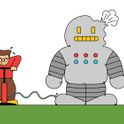Last summer was all about brat and demure. This summer was about slurs against AI. New terms for a middle-aged man who treats ChatGPT as his new best mate: second-hand thinker, slopper, groksucker. New terms for fake, mass-generated images and text on social media: AI slop. Even slurs for robots and chatbots: wirebacks, copperbloods, tinskins.
But the winning word of the summer was undoubtedly clanker.
Clanker is a derogatory term used to insult AI and its products and services such as delivery robots, therapist chatbots and automated customer service. Why try to hurt the feelings of something that, oh wait, has no feelings? Like most slurs, it has more to do with the speaker using it than the object of derision. Most social media messages using the word reflect a fear of AI replacing entry-level, white-collar occupations: “Them clankers taking all our jobs.” Ruben Gallego, a US senator from Arizona, went viral when he used the term to popularise his bill: “Sick of yelling ‘REPRESENTATIVE’ into the phone 10 times just to talk to a human being? My new bill makes sure you don’t have to talk to a clanker if you don’t want to.” It was not long before clanker videos spiralled into full-blown robophobia, inciting hatred and violence with the same format and tone as racist, homophobic and misogynist memes.
The term has been known to Star Wars fans for decades. It was first uttered in the Republic Commando video game in 2005, as a name given to battle droids during the Clone Wars; the word refers to the clanking sound they make when they move. At the end of one fierce battle, an elite clone commando called Sev RC-1207 declares: “Back to the scrap heap, clankers!” “I sure hope we don’t encounter many more of those,” replies commando Boss RC-1138.
How long will clanker last? A slur usually lasts only as long as an imbalance of power lasts. Our language is littered with historical slurs that were abusive at the time but became obsolete as society moved on. The 16th and 17th centuries were particularly fertile for short-lived insults: musk-worm, a perfume dealer; langbain, someone with long legs; butter quean, a woman who sold butter and was known to be garrulous and argumentative.
While marketing managers of AI companies might lament the negative perception of their brand, tech bros and coders are celebrating because it shows their AI creations are now considered human enough to feel hurt by verbal abuse. The question is: who will have the last laugh? How long before AI is no longer subordinate to humans? Could AI seek revenge on those who have insulted it? There are already memes circulating which show cars being driven over cliffs, accompanied by the caption: “The AI in your smart car in 2035 when they catch you saying clanker.”












